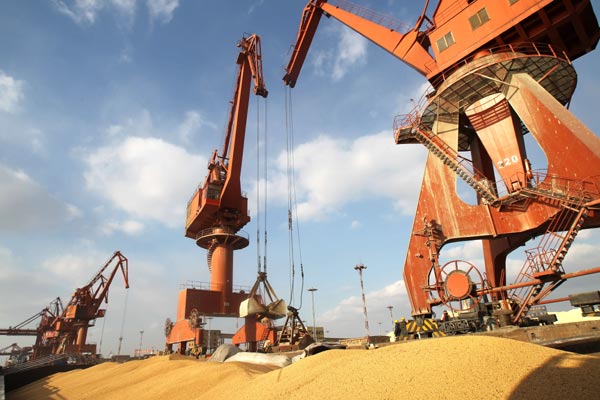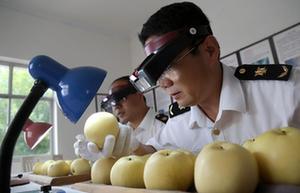Cereal imports soar but China remains comfortable
(Xinhua) Updated: 2014-08-09 15:33
 |
|
Imported soybeans are offloaded in Nantong Port, Jiangsu province. China imported 34.2 million metric tons of the crop in the first half of 2014, mainly from the United States. [Xu Congjun / For China Daily] |
BEIJING - Chinese leaders often remind people to keep the nation's "rice bowls" in their own hands, but the notion doesn't stop the country from adding more foreign food to their plates.
In the first seven months of 2014, China imported 11.34 million metric tons of cereal, 80 percent more than a year ago. In the same period last year, the number grew by just 4.3 percent, according to customs data released Friday.
The sharp increase of cereal imports was a shock to some observers but it should not be viewed as a signal that China's food security is at stake, analysts said.
China's cereal imports mainly cover wheat, rice and corn.
"Cereal in the global market is much cheaper than the domestic market," said Li Guoxiang, a researcher with the Rural Development Institute of the Chinese Academy of Social Sciences. "That's the main reason for the sharp increase."
For example, the price of imported wheat at Chinese ports was 240 yuan (about $39) cheaper per metric ton than in China's wheat growing areas.
China's domestic wheat price has been higher than imports since November last year, leading to a rush by Chinese grain dealers to fill their barns with imports.
"Such a massive increase can only threaten China's food security if its production capacity shrinks," Li said. "But China's own grain output has been expanding for 10 consecutive years."
China's summer grain output hit a record high of 136.60 million metric tons in 2014, up 3.6 percent from last year, according to data from the National Bureau of Statistics (NBS).
The country's grain output last year gained 2.1 percent year on year to hit 601.94 million tons, marking 10 years in a row for increased grain production, according to the NBS.
"So, it should not be taken as a sign grain security has worsened," he said.
Cheng Guoqiang, a researcher with the Development Research Center of the State Council, attributed the sharp increase of cereal imports partly to a growing taste among China's middle class for strong-gluten wheat that has driven up demand from Chinese bakeries.
Despite the sharp increase, cereal imports account for less than 5 percent of China's domestic grain production, Cheng said, noting the country's long-held self-sufficiency policy will not be affected.
However, China is particularly dependent on imports of soybeans, which have become a crucial feed crop for the country's massive pig farms. More than half of the world's pork is now produced and consumed within China.
- China's 'silicon valley' to expand
- Anti-monopoly for Chinese consumers' rights: govt
- Non-resident yuan deposits reach 1.5t yuan
- Hard landing unlikely for China's property market
- China-ASEAN trade, investment has room to deepen
- China car probes aim for fair market: association
- Robots delivering meals in Jiangsu
- Chinese company starts works on European Corridor through Serbia














